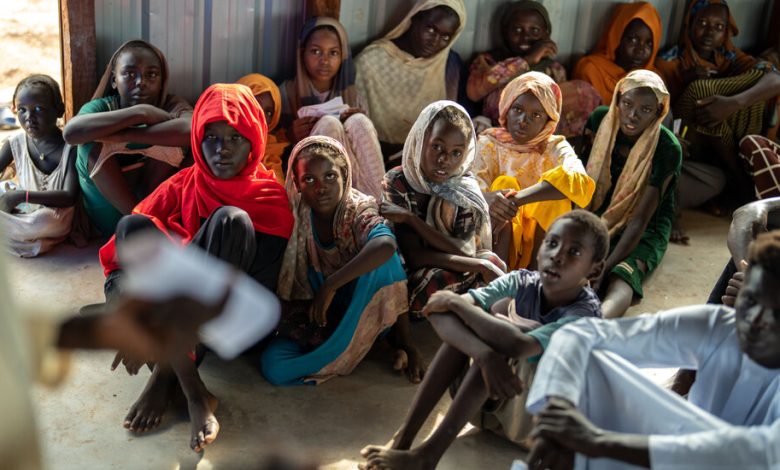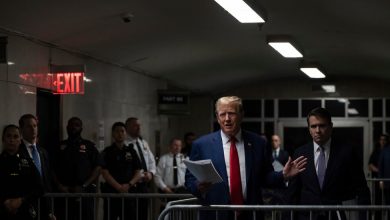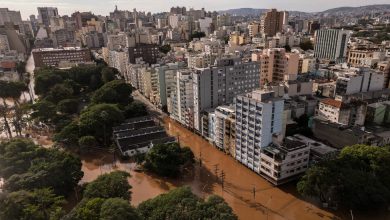Students on the Run, Schools Taken by Troops and a Generation’s Catastrophe

The young girls and boys, wearing colorful scarves, tattered shirts and flip-flops, ran across the dusty ground to form jagged lines and face the teachers at the start of the school day.
The children, hundreds of them gathered in makeshift classrooms, had arrived in this aid camp in recent months after fleeing the war in their homeland of Sudan. But even as they began to gain a sense of normalcy in their schooling, many were still burdened with memories of the vicious conflict they endured, which had left loved ones dead and their homes destroyed.
“We know that pain is lasting inside their hearts,” said Mujahid Yaqub, a 23-year-old who fled Sudan and now teaches English at the school in the Wedwil refugee center, in Aweil in South Sudan. Many of the children, he said, were unable to focus in class and often cried over the memories of their terrifying escape from shellings and massacres.
“We want to inform them that there’s hope,” he said, but “it is painful.”
Universities and primary and secondary schools across Sudan remain closed six months after the war began, jeopardizing the future of an entire generation. With an estimated 19 million children out of school, Sudan is on the verge of becoming “the worst education crisis in the world,” the United Nations Children’s Fund warned this month.
Teachers across the northeast African nation have gone unpaid and young people out of school have been exposed to physical and mental threats, including recruitment into armed groups.
Universities and government educational offices have been destroyed or used as defense positions, and at least 171 schools have been turned into emergency shelters for displaced people, according to a spokesman with the U.N. Educational, Scientific and Cultural Organization.
“If this war continues, the damage to the education system will be irreparable,” said Munzoul Assal, who until April was a social anthropology professor at the Faculty of Economics and Social Studies at the University of Khartoum.
The war between the Sudanese Army, led by Gen. Abdel Fattah al-Burhan, and the paramilitary Rapid Support Forces, led by Lt. Gen. Mohamed Hamdan, has killed up to 9,000 people and injured thousands more, according to the U.N.
Both sides to the conflict said on Thursday that their delegates arrived for the cease-fire talks brokered by the United States and Saudi Arabia in Jeddah — though neither side agreed to a pause in the fighting. Representatives from the African Union and the Intergovernmental Authority on Development, an eight-member regional bloc that Sudan belongs to, were also attending the talks.
With over 7 million people internally displaced, including more than 4.6 million since the conflict began, Sudan is now the largest internal displacement crisis in the world, the U.N. said.
More than 70 percent of health care facilities nationwide have also been shuttered, even as the country confronts rising infections and deaths from cholera, dengue and malaria and tens of thousands of pregnant women struggle to find lifesaving care. Aid efforts are also being encumbered by funding shortfalls, with the U.N. receiving only 33 percent of the $2.6 billion it needs to deliver humanitarian assistance in Sudan this year.
The conflict has continued to intensify in recent weeks across the Darfur region in western Sudan, where ethnically motivated attacks have prompted investigations of war crimes and crimes against humanity by the International Criminal Court. The U.N. Human Rights Council this month also established an independent fact-finding mission to investigate human rights violations in the conflict, a move that was widely welcomed by rights groups.
The paramilitary group, which has increasingly solidified its grip in Darfur, has in recent days shelled Nyala city in South Darfur as it faced off with the army, activists and aid workers said. The clashes have overwhelmed health services, disrupted internet and phone connectivity and destroyed homes and markets.
The paramilitary forces said on Thursday that they had overrun the army’s headquarters in Nyala, giving them effective control over Sudan’s second-largest city.
The paramilitary forces also continued clashing with the army in the capital, Khartoum, and the adjoining city of Omdurman. In recent weeks, both parties have been accused of either shelling hospitals or blocking crucial medical supplies that would keep them running. The fighting has continued amid pervasive reports of looting, torture and sexual violence, pushing many people to pack everything and leave the country altogether.
Many of those arriving in neighboring countries are students whose learning has now been disrupted.
For decades, the education system in Sudan suffered from underfunding and a lack of teacher training, in addition to political interference by the government of the dictator Omar Hassan al-Bashir. But the hopes that many had that conditions would improve after he was ousted in 2019 were quickly dashed. The enduring political crises and the tumbling economy left students crammed into overcrowded classrooms and teachers going on strike over unpaid salaries and poor working conditions.
The war that has now convulsed the nation has only deepened those problems, leaving many students without any prospects.
“I had ambitions for myself, my family and my country,” said Braa Nureyn, a 21-year-old who fled with her family to the Aweil camp and was now sharing a tent with eight members of her family. Fetching water on a recent morning, Ms. Nureyn, a second-year dental student in Khartoum, said it pained her that she was no longer going to campus every day.
“The idea of being a refugee is impossible,” she said. “I avoid thinking about it because there’s no solution.”
The war has also affected thousands of foreign university students who were studying for free in Sudan. For decades, the Sudanese government awarded scholarships to foreign students, mostly from African and Arab countries, as a way to boost Sudan’s cultural diplomacy but also to spread Islam, Mr. Assal, the social anthropology professor, said in a phone interview from Bergen, Norway.
For those students — many of them from poor backgrounds — the war has meant returning home without any prospects of continuing or finishing their education.
“I was hoping I would graduate and help my father with raising the family,” said Alekiir Kaman, a 25-year-old South Sudanese national who was studying computer science at the International University of Africa in Khartoum. But now, she said, “I am starting from zero.”
Aid groups and U.N. agencies say they are ramping up efforts to ensure that access to education is done hand-in-hand with the humanitarian response. Some Sudanese students have been able to enter primary and secondary schools in host countries like Egypt and South Sudan. Rwanda has taken in 200 Sudanese medical students. Education Cannot Wait, a U.N. fund dedicated to educational emergencies, has announced a $5 million grant to support vulnerable school-aged girls and boys.
But as the war drags on, those like Mr. Yaqub, the English teacher at the refugee settlement in Aweil, say they will keep doing what they can with the little they have.
“Being a teacher means having hope in a new future,” he said. “We are teaching the children to be strong mentally and physically so that they can go back to Sudan and be the new generation that rebuilds Sudan.”
Michael Crowley contributed reporting from Washington.




